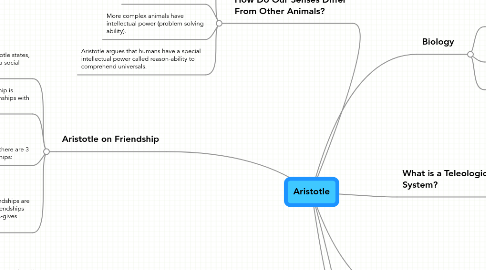
1. How Do Our Senses Differ From Other Animals?
1.1. All forms of life have nutritive, reproductive, and locomotive(move) power.
1.2. Animals differ by having the power of sensation & perception.
1.3. More complex animals have intellectual power (problem solving ability).
1.4. Aristotle argues that humans have a special intellectual power called reason-ability to comprehend universals.
2. Aristotle on Friendship
2.1. In the Politics, Aristotle states, "Man is by nature, a social animal."
2.2. For human relationships, friendship is necessary to perfect your relationships with others.
2.2.1. New node
2.3. He argues that there are 3 types of friendships:
2.3.1. Friendships based on pleasure (sensual)
2.3.2. Friendships based on utility (useful)
2.3.3. Friendships baed on virtue (character building)
2.4. He argues that the last type of friendships are best and lead you to happiness: friendships based on virtue. *example: parents-gives w/o any expectation in return.
3. How Do We Become Virtuous?
3.1. Two categories of virtue: Intellectual & Moral
3.1.1. 2 types of intellectual virtue: philosophical & practical. You must have balance between the two in order to become successful.
3.1.2. Definition of Moral Virtue: Moral virtue is the habit of acting at the mean between the two extremes of behavior.
3.1.2.1. The GOLDEN MEAN
3.1.2.1.1. *example: 1)Excess=Rashness, Deficiency=Cowardice, Mean=Courage. 2)Excess=Shyness, Deficiency=Shamelessness, Mean=Modesty. 3)Excess=Envy, Deficiency=Malicious Enjoyment, Mean=Righteous Indignation.
4. Biology
4.1. "All men by nature desire to know. An example is the delight we take in our senses."
4.1.1. New node
4.2. Nature's course is nothing by chance. Everything has purpose.
4.3. For Aristotle, to engage with the problem of knowledge, we must begin with our senses.
5. How Does Aristotle Differ From Plato and Socrates?
5.1. Aristotle is a scientific and practical thinker
5.2. He does not believe in the world of forms(Plato: another world), but thinks that everything that we can understand are the things we can touch(in this world).
5.3. He creates and applies a scientific model to philosophical investigation.
6. What is a Teleological System?
6.1. Aristotle believed that everything in this world had causes(things that drive them to be creation) He provides four causes:
6.1.1. Material Cause-material from which the thing is made.
6.1.2. Formal cause-shape or form a thing must take in order to be recognized.
6.1.3. Efficient cause-actual force used to make thing.
6.1.4. Final cause-ultimate purpose of the thing.
